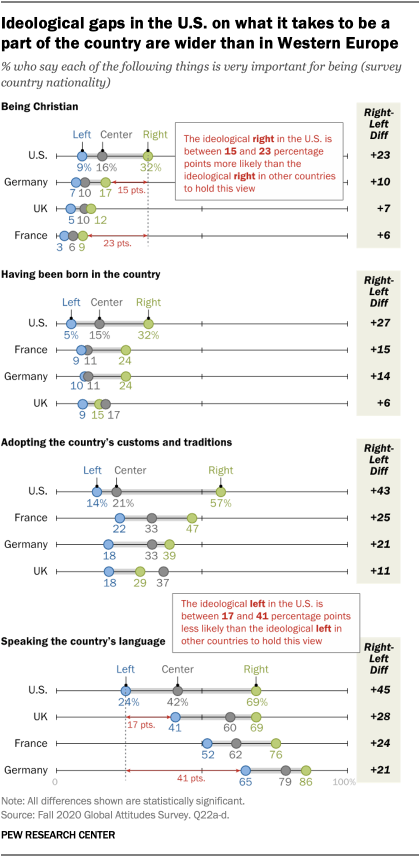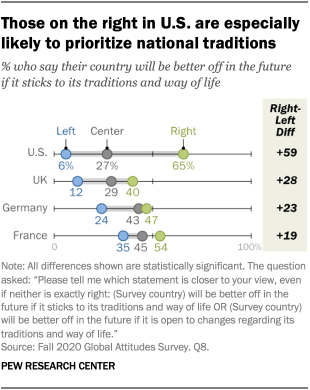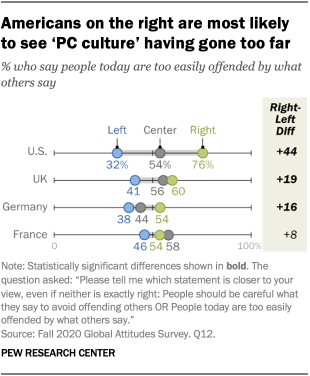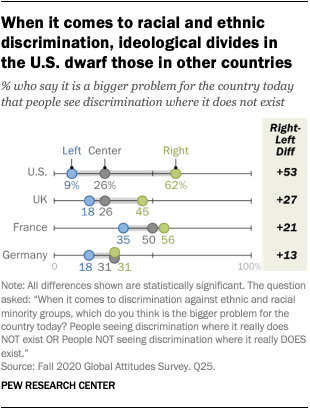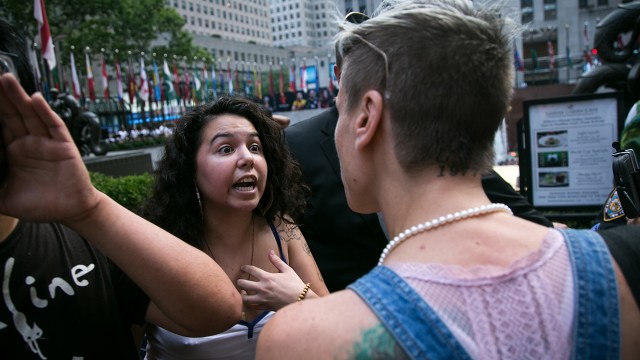
When it comes to key cultural issues, Americans are significantly more divided along ideological lines than people in the United Kingdom, France and Germany, according to a new Pew Research Center analysis of surveys conducted in the four countries in fall 2020.
Across 11 questions on cultural subjects ranging from nationalism to political correctness, the gap between the ideological left and right in the United States – or liberals and conservatives, in the common U.S. parlance – is significantly wider than the ideological gaps found in the European countries surveyed. In some cases, this is because America’s conservatives are outliers. In other cases, it’s because America’s liberals are outliers. In still other cases, both the right and left in the U.S. hold more extreme positions than their European counterparts, resulting in ideological gaps that are more than twice the size of those seen in the UK, Germany or France.
Below, we explore these trends in more detail.
This analysis focuses on cultural attitudes in the U.S., UK, France and Germany. In particular, the focus is on the difference between those who on the left (or liberals in the U.S.) and on the right (or conservatives in the U.S.), based on self-placement on an ideological scale.
The report is based on data from nationally representative telephone surveys of 4,069 adults from Nov. 10 to Dec. 23, 2020, in the U.S., France, Germany and the UK.
Here are the questions used for the report, along with responses, and the survey methodology.
‘What it takes to be one of us’ and immigration
On issues of “belonging” or what it takes to truly be part of a country (e.g., to be “American” or “French”), those on the ideological right in all four countries are more likely than those on the left to say being Christian, speaking the national language, sharing the country’s customs and traditions and being born in the country are “very important.”
Across all four items, though, the ideological gap in the U.S. is larger than in other countries. This is often – but not always – because the views of America’s conservatives stand out. (The U.S. survey was fielded in November and December 2020, after the presidential election but before the inauguration of Joe Biden.)
For example, around a third of U.S. adults who place themselves on the ideological right (32%) say being Christian is very important for being American, but no more than 17% on the right in any other country say the same.
When it comes to the importance of being born in the country, around a third on the U.S. right (32%) think it is very important for being American, compared with no more than 24% of those on the right in any other country. Similarly, those on America’s ideological right (57%) are more likely than their counterparts in France (47%), Germany (39%) and the UK (29%) to say that sharing national customs and traditions is very important to national identity.
The pattern is somewhat different when it comes to speaking the country’s language. While the overall ideological gap is again wider in the U.S. than in the other three countries, America’s liberals are notably less likely than their counterparts in other nations to see speaking English as critical to being American. Only around a quarter of the left in the U.S. (24%) say it’s very important to speak English to be truly American, whereas at least four-in-ten of those on the left in every other country say the same about speaking their national languages.
The ideological left in the U.S. also stands out in its views of whether immigrants want to adopt the country’s customs and way of life. Around eight-in-ten Americans on the left (79%) say this, compared with around two-thirds or fewer in the other countries.
Pride and tradition
In all four countries, those on the ideological right are consistently more likely than those on the left to say their nation will be better off if it sticks to its traditions and ways of life, rather than if it is open to changes. Yet the gap between right and left in the U.S. is more than twice as wide as the gap in other countries. Around two-thirds of those on America’s ideological right (65%) think the U.S. should stick to its traditions, compared with just 6% on the left.
People in the U.S. and the UK are similarly divided along ideological lines when it comes to having pride in the country. A majority of those on the right in both countries say they are proud of their country most of the time, while only around one-in-six on the left in each country say the same. In fact, people on the left in both the U.S. and UK are as likely to describe themselves as ashamed of their country most of the time as they are to say they are proud of their country most of the time. (The remainder describe themselves as being both ashamed and proud.) In France and Germany, on the other hand, pride in the country is not an ideological issue; those on the left and right are about equally likely to describe themselves as proud most of the time.
Political correctness and discrimination
When it comes to “PC culture,” those on the ideological right tend to be more likely than those on the left to say people today are too easily offended. Those on the left, in turn, are often more likely to say people should be more careful what they say.
On this question, too, the ideological gap in the U.S. is more than twice as large as that found in any of the European countries surveyed, with both the American right and left standing out from their counterparts overseas.
On the American right, around three-quarters (76%) say people are too easily offended – significantly higher than the share of those on the right in any of the European countries. Meanwhile, Americans on the left (32%) are somewhat less likely than those on the left in Germany (38%), the UK (41%) and France (46%) to describe people as too easily offended these days.
Americans are also extraordinarily divided when it to comes to perceptions about which is the bigger problem: people seeing discrimination against ethnic and racial minorities where it does not exist, or people not seeing such discrimination where it really does exist. Around six-in-ten on the U.S. right (62%) say the greater problem is people seeing discrimination where it does not exist, while only 9% on the left agree. Elsewhere, the ideological gap on this question is much narrower.
When it comes to religious discrimination, in particular, Americans are far more divided than people in the other countries in their perceptions of whether Christians and Muslims each face bias. The ideological right in the U.S. is substantially more likely than the right in other countries to say Christians face a lot of discrimination – and less likely to say the same about Muslims. Meanwhile, those on the ideological left in the U.S. are more likely than their counterparts on the European left to say Muslims face a lot of discrimination.
There are no significant ideological differences in any of the four countries on the issue of whether Jews face a lot of discrimination or not.
Note: Here are the questions used for the report, along with responses, and the survey methodology.



